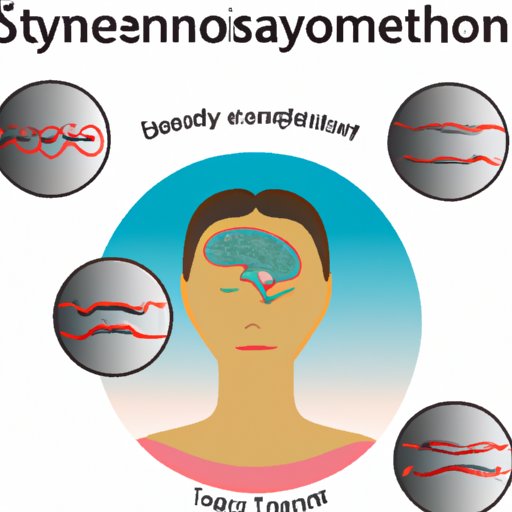
Understanding Serotonin Syndrome: A Comprehensive Guide
Serotonin syndrome is a potentially life-threatening condition that can occur when excessive levels of serotonin accumulate in the body. Understanding the symptoms of serotonin syndrome is crucial in obtaining prompt treatment to prevent further complications and potential mortality. In this article, we will explore what serotonin syndrome is, its causes, and the symptoms one should look out for.
Understanding Serotonin Syndrome: Recognizing the Symptoms
Serotonin is a neurotransmitter commonly found in the brain and central nervous system—it plays a vital role in regulating mood, sleep, and intracellular signaling. However, the excessive accumulation of serotonin in the body, a condition known as serotonin syndrome, can cause a range of symptoms.
There are several factors that can lead to an overload of serotonin – such as the use of certain medications, supplements, or illicit drugs. When these substances are combined with one another, it can result in an increased level of serotonin in the brain, leading to serotonin syndrome.
Some common antidepressants (such as SSRIs and MAOIs), migraine medications like triptans, pain relievers such as tramadol, and illicit substances including ecstasy and LSD can cause serotonin syndrome.
It is essential to seek medical attention immediately upon recognizing any symptoms of serotonin syndrome. Delayed treatment could result in severe complications that may be life-threatening, such as seizures or coma.
Serotonin Overload: Common Symptoms of Serotonin Syndrome
The symptoms of serotonin syndrome can range widely in severity and may include:
- Agitation
- Confusion
- Fever
- Dilated pupils
- Muscle rigidity or twitching
- Fluctuating heart rate and blood pressure
- Diarrhea
- Vomiting
- Headaches
- Shivering
- Sweating
It is important to note that symptoms may differ depending on the severity of this condition – if left untreated, it can lead to more severe symptoms, including seizures, unconsciousness, and even death. Identifying the symptoms promptly is necessary to provide appropriate treatment.
One example of a real-life case demonstrating the severity of serotonin syndrome occurred when an individual combined Bupropion and St. John’s Wort and experienced symptoms of sweating, agitation, hypomania, elevated temperature, and muscle twitching. Her symptoms continued to worsen, and she eventually needed to be hospitalized for treatment.
The Dangers of Mixing Medications: Symptoms of Serotonin Syndrome
It is important to understand which medications can cause serotonin syndrome when taken together; these include:
- The combination of MAOIs (monoamine oxidase inhibitors) with SSRIs
- Tramadol combined with SSRIs, SNRIs (serotonin-norepinephrine reuptake inhibitors), or tryptophan
- Tryptophan combined with SSRIs or SNRIs
- Triptans combined with SSRIs or SNRIs
It is necessary to inform your health care provider of any medications, supplements, or illicit drugs you are taking to avoid potential risks.

A Comprehensive Guide to Serotonin Syndrome: Spotting the Symptoms
Other symptoms of serotonin syndrome to be aware of include:
- Restlessness
- Muscle weakness
- Lightheadedness
- Hallucinations
- Irregular heartbeat
- A rise in blood pressure
Some symptoms may be subtle, which can delay prompt diagnosis and treatment – an instance of subtle symptoms is reported by a patient who used Paroxetine together with St. John’s Wort. She experienced mild symptoms, including sweating, restlessness, and loose stools before eventually being diagnosed with serotonin syndrome.
Loved ones of someone who may be experiencing serotonin syndrome should look out for symptoms and seek prompt medical attention in the event of any concerns.
Serotonin Syndrome Alert: Recognizing Early Symptoms for Prompt Treatment
Recognizing symptoms of serotonin syndrome as early as possible is crucial in obtaining prompt treatment – delaying treatment could lead to severe complications and death. If you are experiencing the symptoms of serotonin syndrome, seek medical attention from your healthcare provider immediately.
Alternatively, you can contact emergency medical services in your area or go to the nearest emergency room – prompt diagnosis and treatment is the key to preventing any complications and reducing mortality rates.
If you have concerns or any questions regarding serotonin syndrome, consulting a healthcare professional is advised.
Conclusion
To summarize, recognizing the symptoms of serotonin syndrome promptly is necessary in obtaining appropriate treatment. It is crucial to inform your healthcare provider of any medications or supplements you are taking and avoid taking medications that interact with each other.
Septic patients are also at higher risk of this condition, and healthcare professionals should consider this when treating them. If you are unsure if you have serotonin syndrome or have any concerns, you can consult your healthcare provider and seek a diagnosis and appropriate treatment to mitigate complications and reduce mortality rates.
Be vigilant; serotonin syndrome can occur unexpectedly and can have severe consequences.





